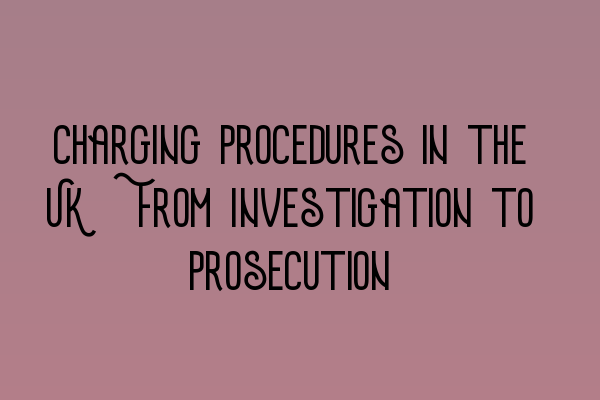Charging Procedures in the UK: From Investigation to Prosecution
When it comes to criminal cases in the UK, a systematic and well-defined charging procedure is essential to ensure justice is served. From the initial stages of investigation to the final prosecution, each step plays a crucial role in upholding the rule of law. In this article, we will take a closer look at the charging procedures in the UK, providing you with a comprehensive understanding of how the system functions.
1. Investigation
Every criminal case begins with an investigation. Law enforcement agencies, such as the police, gather evidence, interview witnesses, and explore all potential leads to build a case against the alleged offender. During this stage, it is crucial for investigators to gather admissible evidence and follow proper procedures to maintain the integrity of the case.
For further insight into criminal investigation methods, we recommend reading our article on decoding criminal evidence rules.
2. Arrest
If the evidence gathered during the investigation points to a suspect, an arrest may be made. The police can arrest an individual on the grounds of reasonable suspicion that they have committed a crime. Following the arrest, the suspect is taken into custody for further questioning.
3. Custody
Once in custody, the suspect’s rights must be respected. The police must inform the individual of their right to remain silent and seek legal representation. It is crucial for suspects to exercise these rights to ensure they are treated fairly throughout the charging process.
4. Charging Decision
After the investigation and necessary interviews, the police will submit the case to the Crown Prosecution Service (CPS) for a charging decision. The CPS reviews the evidence collected by the police and assesses whether there is sufficient evidence to proceed with the prosecution.
For further information on updates in UK criminal laws and staying informed, we recommend reading our article on updates in UK criminal laws.
5. Charging
If the CPS determines that there is enough evidence to support a conviction, they will initiate the charging process. The decision may result in one of three outcomes:
- No further action: If the evidence is insufficient or unreliable, the case may not proceed any further.
- Caution: In less serious cases, the offender may receive a caution without going through a formal prosecution.
- Prosecution: If the evidence is strong and the offense is serious, the CPS will proceed with the prosecution.
For a better understanding of the criminal practice and enhancing your expertise, we recommend attending our workshops and seminars on criminal practice.
6. Pre-Trial Proceedings
Before a case goes to trial, several pre-trial proceedings take place. These include case management hearings, plea hearings, and discovery of evidence. During this stage, both the prosecution and the defense prepare their cases, exchange evidence, and resolve any outstanding issues before presenting their arguments in court.
7. Trial and Verdict
The trial is where the evidence collected during the investigation is presented, and the guilt or innocence of the accused is determined by a judge or a jury. After hearing all sides of the case, the judge or jury deliberates and reaches a verdict. If the defendant is found guilty, a sentencing hearing will follow to determine the appropriate punishment.
For those preparing for the SQE Criminal Practice Exam, we recommend taking our mock tests for SQE criminal practice to simulate exam conditions and enhance your chances of success.
8. Appeals
If either party is dissatisfied with the verdict, they have the right to appeal the decision. Appeals can be made on various grounds, including errors in law or procedural irregularities. The appeals process ensures that even after a conviction, individuals have the opportunity to challenge the outcome if they believe a miscarriage of justice has occurred.
As you navigate through your SQE Criminal Law study group, we encourage you to read our article on enhancing your SQE Criminal Law study group experience for helpful tips and insights.
Conclusion
The charging procedures in the UK are designed to ensure a fair and just legal system. From the investigation to the prosecution and appeals stage, each step plays a vital role in upholding the rule of law. By understanding these procedures, legal professionals and aspiring solicitors can navigate the complexities of criminal law with confidence.
For more information on SQE Criminal Law & Practice and other legal topics, please explore our website and stay up-to-date with the latest industry news from SQE Criminal Law & Practice Law UK.
